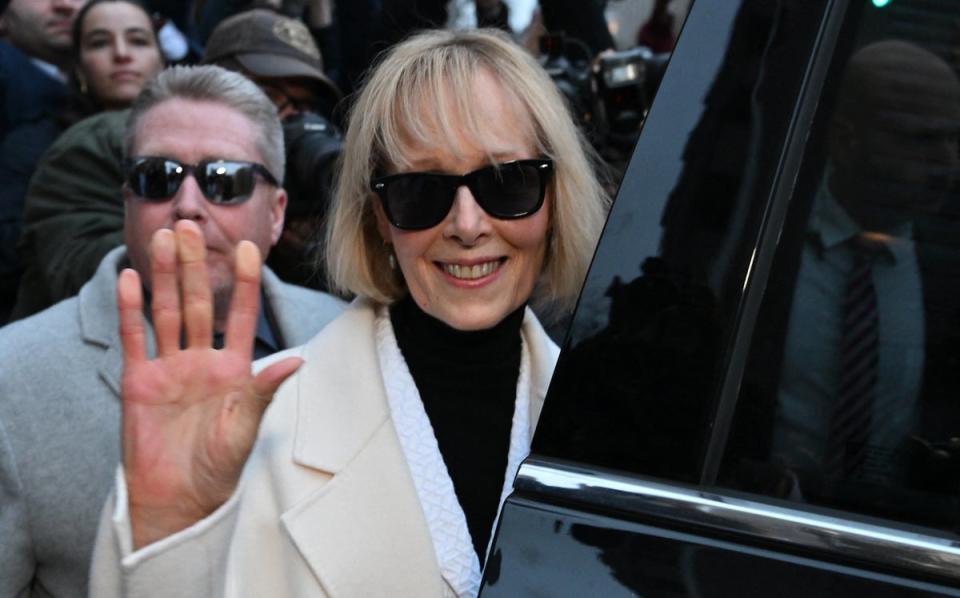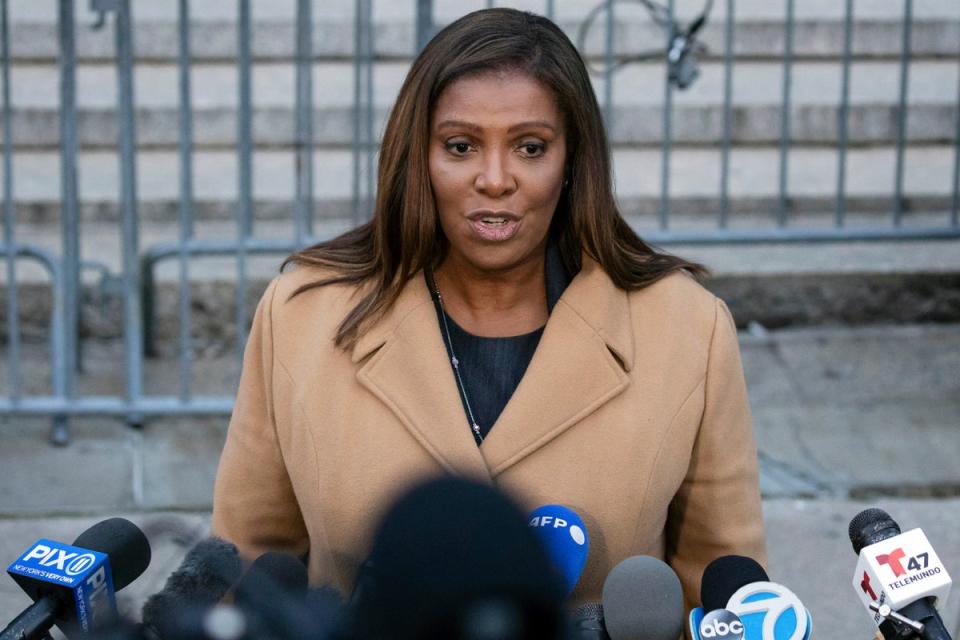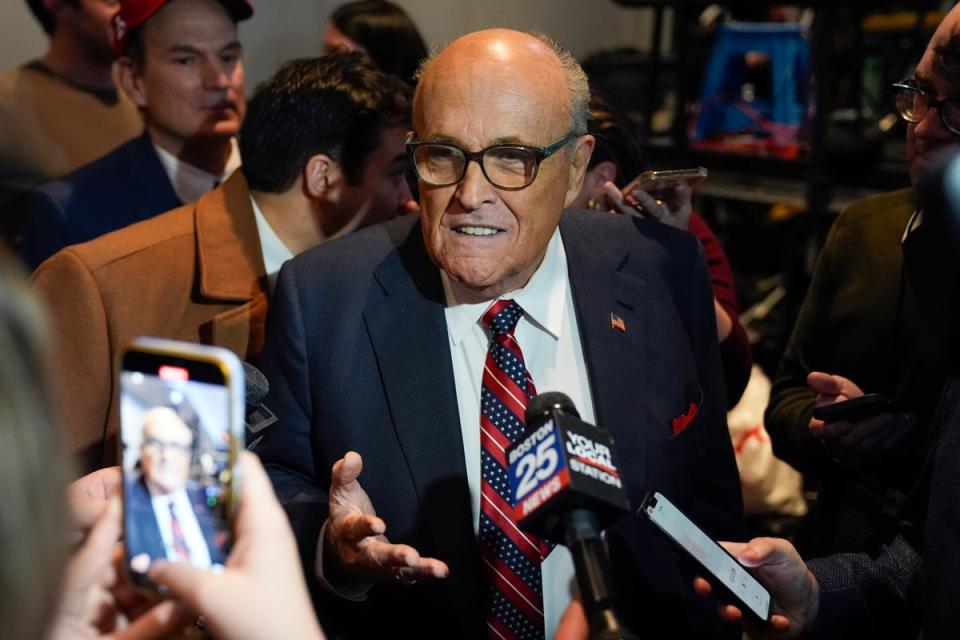How much money could Donald Trump end up paying out in damages?
Donald Trump, the front-runner for the Republican Party’s presidential nomination, has enjoyed a dominant start to the year in the GOP primaries, picking up comfortable wins in Iowa, New Hampshire and Nevada as all but one of his challengers has fallen away, leaving his victory little more than a formality unless Nikki Haley can conjure a dramatic upset against the odds.
It has been a rather different story in the courts, however.
Mr Trump has four criminal indictments and 91 felony charges hanging over his head and remains caught up in a complex web of legal entanglements, any one of which poses a potential threat to his candidacy and one of which has already delivered a financial bombshell that left the candidate reeling.
On Friday 26 January, a New York jury ordered Mr Trump to pay out an astonishing $83.3m to retired Elle magazine columnist E Jean Carroll in compensation for having defamed her, the amount intended to deter him from using his public platform to lash out at those he believes have wronged him, as he currently does on a near-daily basis.
Mr Trump was last year found liable for sexually assaulting Ms Carroll in the dressing room of Manhattan’s Bergdorf Goodman department store in the mid-1990s, an accusation she first levelled against him in her memoir What Do We Need Men For?, which was published during his presidency in 2019.
The Republican’s subsequent denials, claiming never to have even met his accuser and insisting she was not his “type”, ultimately led to a second civil trial that ended last month with the jury deciding Mr Trump should pay Ms Carroll a sum far in advance of the $10m she and her lawyer Roberta Kaplan had asked for as compensation for the reputational damage she had sustained, Mr Trump’s smears having caused her to receive a deluge of abusive messages and death threats from his supporters.
The nine-member panel, who were advised by Judge Lewis Kaplan to keep their identities a secret for their own safety, awarded Ms Carroll $65m in punitive damages plus more than $18.3m in compensatory damages.
Mr Trump had already stormed out of the courtroom before that decision was read out, having given a brief four-minute testimony a day earlier, so it was left to his attorney Alina Habba to rage about the outcome in front of the world’s press, vowing an appeal and calling the jurors “ridiculous”, the very word the candidate himself used when complaining on Truth Social later that evening (a rant in which, interestingly, he did not mention Ms Carroll by name).

Things could be about to get a whole lot worse for Mr Trump as another potentially devastating lawsuit draws to a close in New York this week, this one posing a significant threat to his vast real estate empire and meaning he could be prevented from ever doing business in his hometown again.
Judge Arthur Engoron is expected to deliver a judgement in the civil fraud trial brought against the Trump Organization by state attorney general Letitia James accusing Mr Trump, his adult sons and their chief associates of routinely inflating or overestimating the value of company assets between 2011 and 2021 in order to secure favourable loans and insurance deals from lenders.
After an 11-week trial that began last October, the case took a further turn just days before the judge was due to deliver his verdict when a court-appointed monitor submitted a report indicating that many of the company’s financial disclosures are “either incomplete, present results inconsistently” or “contain errors” and alleging that a $48m loan for one of its properties may have never actually existed.
All in, Ms James is seeking $370m plus interest in financial penalties to make things right.
Mr Trump and his company would be “on the hook” for the majority of that amount should Judge Engoron side with Ms James and order it to be paid in full, according to Forbes, although around $10.5m would be owed by Donald Trump Jr, Eric Trump, former CFO Allen Weisselberg and ex-controller Jeffrey McConney.
The combined total of the Carroll payout and the fraud trial fine would therefore leave Mr Trump being ordered to pay out an astronomical $453.3m in a matter of weeks.

Again according to Forbes, Mr Trump’s net worth stood at around $2.6bn as of last September, which is a considerable amount and some advance on the $40m he is said to have inherited from his late father Fred Trump but also some way short of the same outlet’s $3.2bn estimation of his worth in 2021 or the $4.5bn he was worth in 2015, the year before he won the presidency.
Of that $2.6bn, Forbes calculates that Mr Trump has only $426m in cash and liquid assets with which he would be able to pay off his legal obligations.
On that basis, Bloomberg has estimated that a bill for $453.3m would swallow the Republican’s liquid assets and eat into his net worth by as much as 15 per cent.
It is difficult to be sure about the real extent of Mr Trump’s fortune, however, given that, when he was running for president in 2016 and throughout his single term in the White House between 2017 and 2021, he repeatedly refused to open his books for public scrutiny, falsely claiming he could not do so because he was under audit by the Internal Revenue Service.
Even if that was true, there was nothing to stop him from making the same commitment to transparency as his predecessors in the Oval Office, which did not stop Mr Trump from insisting otherwise.
The Republican will, of course, angrily appeal both verdicts (assuming Judge Engoron does not find in his favour), although that may not save him from having to put the money in escrow while the appeals process plays out.
He might have hoped to be bailed out by either his Save America PAC or Make America Great Again super PAC, although neither is believed to have anything like the funds required to cover the damages he could be asked to pay.
Jennifer Rodgers, a former federal prosecutor, has meanwhile told Bloomberg that Mr Trump would not be allowed to use his PACs’ campaign funds to pay his legal fees in these cases because there are no “exceptions that would cover a damages award for a matter not involving him as a candidate or officeholder”.

And the bad news keeps on coming for Mr Trump.
It was also reported last month that his former personal attorney Rudy Giuliani has listed a claim against the former president over unpaid legal fees in a new bankruptcy filing.
Mr Giuliani has since revealed the amount owed to be roughly $2m and will be desperate to be reimbursed for his (unsuccessful) services representing the outgoing president in the aftermath of the 2020 presidential election, when the attorney filed and then lost some 62 lawsuits contesting vote counting and certification practices in nine states.
Mr Giuliani declared bankruptcy in December, days after a federal judge ordered him to “immediately” pay more than $148m to a pair of Georgia election workers a jury found he had defamed.
The New York Times reported last August: “Mr Trump has never explicitly told Mr Giuliani why he is effectively stiffing him, but the former president has pointed out that he lost the cases related to the election.”
It added that Mr Trump had instructed his aides not to pay Mr Giuliani “a dime” but that the latter had received an estimated $340,000 from the aforementioned Save America PAC to recoup some of his costs.

 Yahoo News
Yahoo News 
